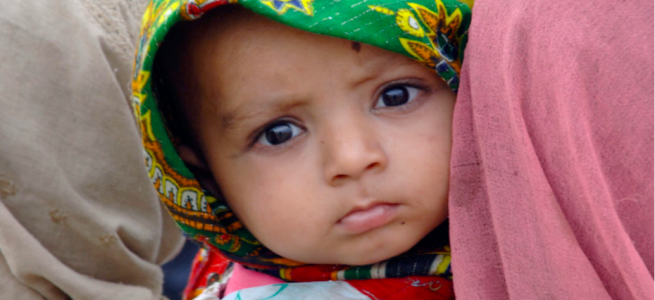14 May 2023
On Tuesday 2nd May, the BBC Ten O’clock news had the lead story of the humanitarian crisis of child deaths in Afghanistan. The viewers were warned that some of the images might be upsetting.
The segment showed the intensive care unit in the hospital in the city of Ghor. Mothers were with their young children who were mostly suffering from pneumonia. Some were holding oxygen tubes near the noses of the infants to facilitate breathing. There was a shortage of oxygen and masks. There were very few nurses and doctors around. The ward was overcrowded and under-equipped. There was one ventilator in the hospital. It was clear that there were no antibiotics around to give to the infants.
The camera focused on one mother sitting by her child with an oxygen tube. The child was not awake. A doctor then came with an oxygen mask and put it on the child’s face. He used a stethoscope to monitor the infant’s heartbeat. The infant had passed away. The mother broke down, sobbing. This was heart-breaking.
The narrative laid the blame on the Taliban for the humanitarian catastrophe. Washington and its allies have blamed the humanitarian situation in Afghanistan on the Taliban’s failure to uphold human rights and in particular its repression of women. This narrative, continually amplified by the corporate media, is very powerful.
I talked to several friends about my horror at the deaths of Afghan children. In all cases their stock responses were similar: blaming the Taliban for the catastrophe.
To be sure, the Taliban do not smell of roses. They are arch-Muslim conservatives. Their education in the madrasas of Pakistan during the 1980s inculcated the tenets of fundamentalist Islam based on a literal interpretation of the Holy book of the Quran. Ideologically, they are rooted in the Deobandi Islam influenced by Saudi Whabbism. They received their military training with guns and dollars supplied by Saudis and the US though Pakistan. They joined with other Afghan Mujahideen to drive the Soviet troops out of Afghanistan, a key American objective. President Reagan described the Mujahideen as heroes.
Their first period of ruling Afghanistan, from 1996, was a dark period, with the curtailment women’s rights, banning of sports and music and the strict enforcement of Sharia law. The situation changed after 9/11, with the bombing of the twin towers and President Bush declaring the war on terror. Afghanistan was invaded in 2001 by the US and UK and the Taliban regime collapsed.
The US occupation of Afghanistan lasted for 20 years, with an abrupt departure in July 2021. During that period the country had a succession of governments through managed elections which were beholden to the US. These puppet regimes turned out to be corrupt. US dollars flowed into Afghanistan only to maintain military control of the country. Vast sums lined the pockets of US military contractors.
There was development in the main cities but rural areas where the majority of Afghans live were largely untouched. The elite business class got rich. On the other hand, the majority of Afghans remained poor. Afghans continually bore the brunt of the US counterinsurgency with its aim of eradicating the Taliban. The US was not averse to bombing wedding parties and raiding villages during the night.
Clearly the Taliban ultimately achieved their goal of taking over the country. The US immediately imposed sanctions on the country. The Biden administration froze the Afghan foreign reserves of $9.5 billion and stopped shipping the US dollars that the Afghan Central Bank relied on.
This was deadly for the Afghan economy since the country needed hard currency reserves to maintain a stable financial system. Furthermore, the cutting of foreign aid, which accounted for 45 per cent of the GDP and funded 70 per cent of the government budget, has resulted in a drastic squeeze on public finances.
The shortage of cash and banking relationships crippled the Afghan banks which were forced to impose a $400 withdrawal limit and restrict business cash flow. Businesses were unable to meet their payroll demands and laid off workers which led to increased unemployment. With non-humanitarian aid suspended, imports fell and economic output contracted by 30 percent.
The Afghan currency depreciated by more than 30 percent following the sanctions, driving the price of food and other essential beyond the reach of most people. The number of people without income soared. Farmers gave up working on their land and medicines became scarce and unaffordable.
Within months, the economic meltdown was so precipitous that the shadow of looming famine could be seen from evidence taken from Afghan people on the ground.
The UNDP report for 2023 estimates that out of a population of 40 million, the number of poor people has risen to 34 million, an increase of 15 million since 2020. It says: “Poor Afghans are being forced to cut back on consumption (including for food), borrow heavily, beg and resort to desperate measures to survive. Some sell their homes, land, or income-generating assets; others end up commodifying their own family members, turning children into labourers and young daughters into brides.”
The US has released $3.5 billion of Afghanistan’s official reserves by setting up the ‘Afghan Fund’ with the aim of stabilising the Afghan economy. The Fund may be used to pay for critical imports, such as electricity, payment of arrears to international financial institutions and for essential banking services through SWIFT.
However, the trust fund is controlled by a foundation created by Afghan nationals who held positions in the Afghan Central Bank prior to the Taliban takeover and whom the US has accredited as representatives of Afghanistan.
Hearing the ever more desperate alarm raised by aid organisations, the US and other Western nations have turned to funding emergency aid through the United Nations and other humanitarian organisations. Such aid can bypass the sanctions regime through the issue of exemptions by the Security Council, making it easier for those delivering aid to carry out their work without legal risk.
But aid will replace only a fraction of the country’s loss of income. Furthermore, there are enormous difficulties in delivering any aid when the banking system has stalled, with international banks and aid agencies reluctant to transfer funds. Additionally, there are breakdowns in the transport system and other essential services.
Although the Biden administration has issued a set of licenses to facilitate humanitarian transactions with the Afghan government, the licenses forbid any contracting for services with Taliban institutions. The intent is to prevent bolstering the stature of the Taliban government and its ability to divert funds for nefarious purposes.
An estimated 4 million vulnerable people will likely suffer from acute malnutrition in 2023. Of these, 875,227 children are classified as having “Severe Acute Malnutrition” and 2,347,802 children Moderate Acute Malnutrition. Furthermore, 804,365 pregnant and lactating women are suffering from acute malnutrition. Children who are malnourished are more likely to die from other diseases, even when they can get enough calories and nutrients to survive.
Some 167 children are dying every day in the country. Of these roughly a half will be girls – an entire generation lost. Young girls who are growing up today are likely to be stunted because of malnutrition. Teenage girls will be spending their lives in dire poverty. How many tens or hundreds of thousands of women and girls should be sacrificed in order to punish the Taliban?
The Biden Administration never ended the war. It simply seamlessly shifted from hot war to an economic war of sanctions. These sanctions are likely to take the lives of more civilians than those killed over two decades. Punishing the Afghan people by strangling them economically is morally heinous. It can be best described as imperial sadism against a people who have endured enormous suffering over decades of occupation.
The international community has not recognized the Taliban as the government of Afghanistan, viewing them instead as the de facto authorities. Listening to Taliban spokespersons, they are deeply resentful of this. They do not appreciate any discussion on the humanitarian situation organised by the UN without their participation. They say they are prepared to discuss all the issues of concern. The fact that the Afghan fund is not under their control but that of their adversaries is a case in point. They want aid to be delivered through their own networks.
The US is the greatest obstacle against the recognition of the Taliban government. Using sanctions as a leverage to control the Taliban has never worked. When the Taliban controlled all the state institutions from 1996 to 2021, sanctions led to a collapse of per capita income by 76 percent and a decline in educational enrolment with the near-disappearance of female schooling.
The United States should swallow the bitter pill of working with the Taliban-led government in order to prevent a failed state in Afghanistan. The Taliban are no worse than many other nefarious governments that the US has supported in the past and the present.
All sanctions on Afghanistan should be lifted to enable the country to access commercial interchange within the world economy. Aid should be provided to urgently alleviate the humanitarian crisis. An Afghanistan interchanging goods and services with other nations can begin to develop its productive forces. Its people interacting with other people in the world are more likely to seek and demand change. Other governments are more likely to influence the Taliban to change their policies.
Recently, two religious scholars who are well-known within Afghanistan courageously criticised the ban on the education of girls. One scholar, Abdul Rahman Abid said, “My daughter is absent from school. I am ashamed. I have no answer for my daughter.” He added: “My daughter asks why girls are not allowed to learn in the Islamic system. I have no answer for her.” Such internal criticism is vital to bring about change in Afghanistan for the future.
Saleh Mamon is a retired teacher who campaigns for peace and justice. His research interests focus on imperialism and underdevelopment, both their history and continuing presence. He is committed to democracy, socialism and secularism. He blogs at https://salehmamon.com/
Image: Afghanistan: Child Waiting to See Doctors by Michael Bracken. Source: US Department of Defense, via pingnews. https://www.flickr.com/photos/pingnews/499010605/in/photostream/
First published Labour Hub on May 14 2023 https://labourhub.org.uk/2023/05/15/must-afghan-children-die/


